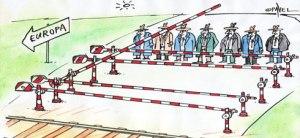 The European Council held a regular autumn meeting in Brussels on 17th and 18th October 2019. Besides Brexit, Turkey, clima change etc the plan was to determine when to start of negotiations with Republic North Macedonia and Republic Albania for their EU membership. As predicted by many analysts in recent weeks, neither Albania nor North Macedonia received a date at the EU Summit to launch negotiations for their EU accession. EU – again – could not decide the date when to start these negotiations.
The European Council held a regular autumn meeting in Brussels on 17th and 18th October 2019. Besides Brexit, Turkey, clima change etc the plan was to determine when to start of negotiations with Republic North Macedonia and Republic Albania for their EU membership. As predicted by many analysts in recent weeks, neither Albania nor North Macedonia received a date at the EU Summit to launch negotiations for their EU accession. EU – again – could not decide the date when to start these negotiations.
In addition to the issue of stability in the Western Balkans region, it also concerns the credibility of European leaders. Namely, at the EU summit in June 2018, they decided that they would assign in 2019 a date for the start of negotiations to North Macedonia and Albania, if they meet conditions for the start of negotiations. For both countries, and especially for North Macedonia, this has been clearly achieved.
Although only France openly opposed EU negotiations with North Macedonia and Albania few more EU members quietly agreed this position. Given that the EU has 27 members (excluding the UK), there is always the possibility of different conditions and blockades. According IFIMES the EU hesitance can have strategic consequences in the Western Balkans and it is due to uncertainty about EU membership and pressures from the domestic public, that certain countries could change their geopolitical orientation.
EU Commissioner Johannes Hahn, who openly supported North Macedonia and was obviously disappointed, told Reuters that “It’s becoming harder and harder to provide a proper explanation (for the delay). If we agreed with our partners on the steps to take, and our partners are delivering, it is then our turn to deliver.”
Indeed! The EU Commission concluded following in its latest [Council conclusions on enlargement and stabilisation and association process – June 2019] report related to Albania:
Reaffirming its conclusions of 26 June 2018, the Council takes good note of the Commission’s recommendation to open accession negotiations with Albania based on its positive evaluation of the progress made and of the fulfillment of the conditions identified by the Council. In light of the limited time available and the importance of the matter, the Council will revert to the issue with a view to reaching a clear and substantive decision as soon as possible and no later than October 2019.
And related to Norh Macedonia [same report ] as follows:
Reaffirming its conclusions of 26 June 2018, the Council strongly welcomes the historic and unprecedented Prespa Agreement, as well as the Treaty on Good Neighbourly Relations with Bulgaria, and takes good note of the Commission’s recommendation to open accession negotiations with the Republic of North Macedonia based on its positive evaluation of the progress made and of the fulfillment of the conditions identified by the Council. In light of the limited time available and the importance of the matter, the Council will revert to the issue with a view to reaching a clear and substantive decision as soon as possible and no later than October 2019.
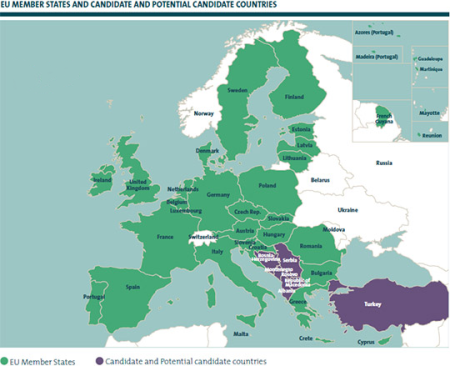
EU Credibility?
As a decision on issuing a date to begin enlargement talks has already been delayed on two previous occasions Throughout this period, European Commission officials have argued that it is important to send the right message to the nations of the Western Balkans that have carried out reforms demanded by Brussels. They also assert North Macedonia should be rewarded for settling its long-running name dispute with Greece via the June 2018 Prespes Agreement. To give a date to Albania and North Macedonia about starting entry negotiations to the EU is not a big deal. Once given, negotiations to conclude the 35 chapters of the acquis, if ever concluded, could well require a decade. Therefore, for the bloc to grant a date, is irrelevant.
Practically the Eastern EU enlargement for the moment is stopped. Croatia’s membership was exemption and mistake, Turkey’s EU bid is dead as continent simply has no intention of ever incorporating 70 million Muslims and the rest – such as Serbia and other Western Balkans – are still more or less in association process.
According IFIMES some experts have been pointing out that 15 EU member countries would not be able to fully meet the membership criteria now, which are required from the Western Balkans countries. They also note that Bulgaria and Romania were admitted to the EU membership, as well as Croatia recently, without imposing so strict requirements of the membership.
One example about (Non)functioning of the EU was the dialog between official Belgrade and Pristina which was led by the EU as a mediator. The dialog was a fiasco. No significant progress has been made in the last ten years since the Western Balkans region was left to the care of the EU. The justified questions are, is the EU a reliable partner? Same time many Western Balkan countries and other big actors than EU have been active developers.
Croatia as typical example
Croatia is typical example of new European behavior. Actually, Croatia does not respect the decisions of international arbitration court regarding the cross-border dispute with Slovenia. At the same time, Republic of Croatia does not respect the decision of the International Residual Mechanism for Criminal Courts for the crimes perpetrated in the former Yugoslavia (MICT), by which certain highly positioned officials of Croatia and Croatian Democratic Party (HDZ) are sentenced by absolute decision for participation in the associated crime against Bosnia and Herzegovina. HDZ is a political party against which the process is ongoing at the district court in Zagreb.
It should be added that the position of Serbian community in Croatia suddenly deteriorated after Croatia became full member of the EU. Serbian community was cooperative and important factor, which contributed that Croatia became the EU member. The audit of events from the Word War II is ongoing in Croatia where the attempts are made to rehabilitate fascist and collaboration armies and present them as anti-fascist. Of enormous importance is the position of Jewish community, which still did not resolve the issue of returning its property taken from them. Audit of history contributed that the Jewish community and other anti-fascist associations independently and in fact separately celebrate anniversary of liberation from the concentration camp Jasenovac that was held by the Ustasha regime. Representatives of the Croatian state do not take place at those commemorations. Pro fascist appearances and speeches of the president of the Republic of Croatia Kolinda Grabar-Kitarović (HDZ) and her open involvement in internal affairs in the nearby Bosnia and Herzegovina are evident. Recently – 2018 – the Croatian government document allows that “Ustasha” (Croatian Nazi brand from WWII) salute “Za dom spremni” (equivalent to Hitler’ “Seig Heil”) can be used publicly.
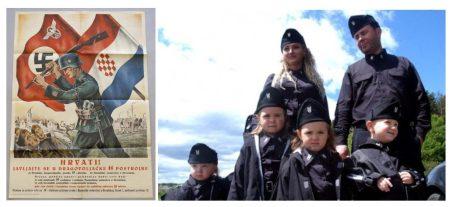
Croatia – Past and present
Croatia as the EU and NATO member did not resolve open border issues with any of the neighbours except for Hungary, since it inherited that border from former Yugoslavia. Indeed in the Western Balkans it is in conflict with almost all states. The analysts find worrying the fact that the EU and NATO institutions did not react to the behavior of Croatia when it comes to Bosnia and Herzegovina and Serbia, because it is evident Croatia misuses its EU and NATO membership. Many war criminals find their shelter in Croatia.
Development without EU functioning
The Western Balkans leaders are aware of the need to take strong steps towards mutual cooperation, which will be aimed at creating better living conditions for citizens and, especially important, stopping the trend of mass displacement of population from the region. Analysts believe that the countries of the Western Balkans must establish strong political, economic, cultural and any other form of cooperation and act jointly towards the EU, as a group of states with clearly defined requirements. Regional cooperation does not mean that the countries of the region have given up their European path and the EU membership, it is important with EU perspective or without it.
One example could be the cooperation within the so-called Višegrad group of countries (Hungary, Poland, Czech Republic and Slovakia) which was formed to make it easier and faster for these countries to join the EU and NATO. Therefore, it could be vise for the countries of the region to act jointly towards the EU and / or other foreign policy initiatives.
While (Non)functioning of the EU is obvious the good thing is that many countries in Western Balkans – except Croatia – have been active with their own development work and cooperation. Besides improving their societies e.g. according EU chapters of the acquis they have developed their bilateral and regional cooperation.
Few examples of this:
- In Novi Sad on October 10, 2019 trilateral meeting between president of Serbia Aleksandar Vučić (SNS) and prime ministers of North Macedonia and Albania, Zoran Zaev (SDSM) and Edi Rama (PS) was held. Declaration of measures for establishment of „small Schengen“ was signed between the three countries. This declaration should help the entire Western Balkans region to start functioning in four key EU freedoms – freedom of movement of capital, goods, services and people.
- Joint declaration foresees elimination of state border controls and other obstacles to simpler movement in the region until 2021, and also to enable citizens to travel in the region with personal ID card only as well as to find employments anywhere if they have the certificate of their qualifications.Declaration also foresees recognition of diplomas in the region as well as better cooperation in combatting organised crime and support in cases of natural disasters.
- President of Serbia Aleksandar Vučić invited all so-called members of the Balkans six to accept the document about “small Schengen”, regardless of their differences referring to the recognition of Kosovo.
- The prime minister of North Macedonia Zoran Zaev said that the initiative for economic networking of the countries in the region should be joined by all six Western Balkans countries (Serbia, North Macedonia, Albania, Bosnia and Herzegovina, Montenegro and Kosovo).
- Also late October 2019 the president of Serbia Vučić held in Belgrade trilateral meeting Serbia-Turkey-Bosnia and Herzegovina and the joint basis for commencement of works on highway Belgrade – Sarajevo was laid, which is one of the important infrastructure projects.
Other players
Today still the EU is overwhelmingly dominant as an external partner, as on average 60% of exports from the six Western Balkan countries go to the EU. However some other players are active in Western Balkans and this activity could be more attractive in future when enlargement process is blocked or at least frozen. Few examples:
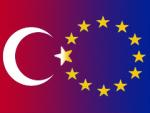 Turkey has been very active in Balkans during recent years; its trade with the Balkan countries increased to $17.7 billion in 2008 from about $3 billion in 2000. Turkey’s banks provided 85 percent of loans for building a highway through Serbia for Turkish transit of goods to the EU. In 2008, Turkish Airlines bought a 49 percent stake of Bosnia’s national carrier, BH Airlines, and other Turkish companies are keen to invest in shops, supermarket chains and hotels. In addition Serbian exporters have been selling their products in Turkey free of customs duties.
Turkey has been very active in Balkans during recent years; its trade with the Balkan countries increased to $17.7 billion in 2008 from about $3 billion in 2000. Turkey’s banks provided 85 percent of loans for building a highway through Serbia for Turkish transit of goods to the EU. In 2008, Turkish Airlines bought a 49 percent stake of Bosnia’s national carrier, BH Airlines, and other Turkish companies are keen to invest in shops, supermarket chains and hotels. In addition Serbian exporters have been selling their products in Turkey free of customs duties.
Serbia and Israel have signed an Agreement on bilateral trade and economic cooperation. Israeli investors have so far invested over $500 million in Serbia. The major Israeli investments in Serbia are construction of the Usce business center and Airport City Belgrade business complex in New Belgrade. Some good background for cooperation is that Serbia was the second country in Europe to recognize Israel in 1948 and Israel refused to support the 1999 NATO bombing of Yugoslavia, leading to admonishment from the United States. Ariel Sharon criticised NATO’s bombing as an act of “brutal interventionism”. Also Israel does not recognize Kosovo’s independence as a sovereign state.
Related to Russia, according NEWEUROPE , the TurkStream pipeline will surface on the shore of the European part of Turkey near Kıyıköy with gas delivery point at Lüleburgaz for the Turkish customers, and a border crossing between Turkey and Greece in İpsala serving as delivery point for the European customers. Gazprom said on 11 October that TurkStream gas pipeline is going to be brought into operation before the end of 2019. “Construction of the receiving terminal on the Black Sea coast near the Kiyikoy settlement is nearing completion. The landfall section in Russia and the Russkaya CS are ready for operation,” Gazprom said.
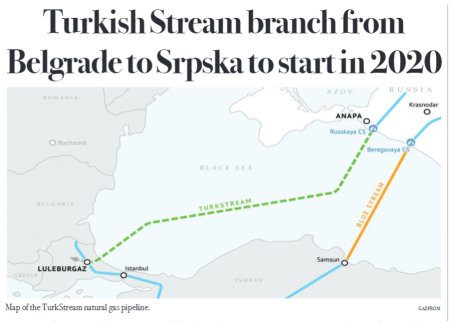
Also China has found an opportunity to use the Balkans as an entry point into the lucrative European market. The most notable is the Belt and Road Initiative, the ambitious project to build land and maritime networks that will link Asia with Africa and Europe. Chinese companies have also snapped up critical industries e.g. in Serbia such as a copper mine, a steelmaker and a thermal power plant, along with high-speed rail lines, roads and ports.
Last year 3.6 billion euros were invested in Serbia from abroad and that in 2019 there will be even more.In the United Nations Conference on Trade and Development, UNCTAD report for 2018, it was noted that inflows in Serbia grew by 44 per cent to $4.1 billion and that Serbia became the second-largest recipient of foreign direct investment among transition economies.
My view
“If the Balkans find that too many obstacles are strewn about the road to Brussels, they may well be tempted to set out on the shorter road to Istanbul” (Misha Glenny, Balkan political analyst)
The EU was made as peace project after the end of the World War II and it enabled to ensure permanent peace in Europe and long-term stability. In recent past, in the Western Balkans though, several wars were going on. If EU wants peace project to be continued, it needs to be implemented also in the Western Balkans countries. European leaders have often confirmed their support to the Western Balkans and its Euro Atlantic road, however the real actions are missing. One can estimate that with this inability EU will lose its credibility as partner at least in Western Balkans and the countries might find more attractive possibilities elsewhere e.g. from Russia, China and Turkey.
Many – still non-member – Balkan countries, Turkey and one disputed region (Kosovo) have some vision about EU association. While considering this in my opinion three aspects should be highlighted:
- Why to join? Due the needs of people or due the needs of Brussels or elite?
- When related to time-line? Association process is long and circumstances are changing, after EU/Eurozone crisis who know what kind of EU if any still exists, same time other regional and global power-centers are rising and options should be open.
- Where? Now it is open question if country is joining in future to strict federation with martial law, to some sub-category of loose federation, confederation, open discussion forum or free trade zone only.
- After this the forth question – how – is the easy one.
The best scenario from my point of view could be some kind of EU Lite version. A bit of similar ”privileged partnership” agreement than planned earlier with Turkey. EU Lite should be build simply to EU’s early basics as economical cooperation area including a customs union, the EU tariff band, competition etc linked to idea of the Common Market. EU Lite could also apply a structure of Confederation. Also some kind of fiscal confederation can be shaped. EU Lite could be described also as a political union and there could be some forum for national parliamentarians and party leaders. Federalist intentions, the EU puppet parliament and the most of EU bureaucracy should from my point of view put in litter basket together with high-flown statements and other nonsense.
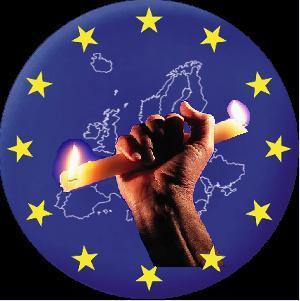
More background and sources:
IFIMES/ Research – Western Balkans 2019: Does the EU push the Western Balkans countries to the Russian “hug”?
Key EU documents of enlargement [2019]:
- Council conclusions on enlargement and stabilisation and association process – June 2019
- Albania Report 2019
- Bosnia and Herzegovina Analytical Report 2019
- Kosovo Report 2019
- Montenegro Report 2019
- North Macedonia Report 2019
- Serbia Report 2019
- Turkey Report 2019
This article first appeared in Conflicts by Ari Rusila blog

